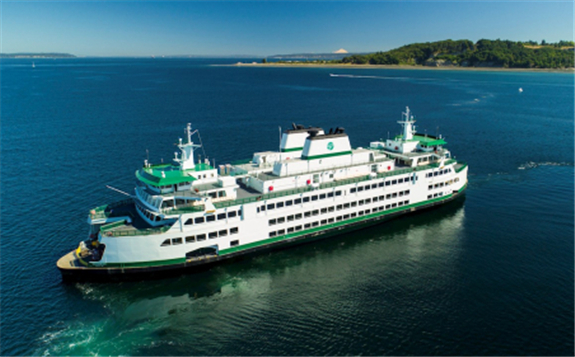American shipbuilding company Vigor Fab LLC has selected ABB as the hybrid-electric propulsion and energy storage system provider for the newest additions to the Washington State Ferry fleet—the largest US ferry system.

The new Olympic Class ferries, which will have the capacity to carry 144 cars and 1,500 passengers each, mark a new era for the Washington State transport operator in the shift toward technologies that enable significant reductions in greenhouse gas emissions and fuel use.
Upon delivery in 2024, the initial vessel of the series will be the first newbuild in Washington State Ferry’s fleet to feature hybrid-electric propulsion and a high capacity energy storage system. The new vessels will be able to fully operate on battery power and will have the capability to revert to hybrid mode, if required.
Leveraging ABB’s Onboard DC Grid power distribution system and proven drive technology, the new ferry design will optimize energy use, whether drawing on main engine power, battery power or a combination of the two. The battery power can also extend zero-emissions capability along the supply chain by using renewables and hydroelectric power.
A DC-based power system enables simple, flexible and functional integration of energy sources such as variable speed gensets and shaft generators, batteries and fuel cells. Also, a DC- and power-electronics-based power system provides a solid platform for digital solutions onboard a vessel.
By 2040, the Washington Ferry System plan is to replace 13 existing diesel ferries with hybrid-electric newbuilds and to convert six other ferries to plug-in hybrid, with recharging capacity installed at many ferry terminals. All hybrid vessels will be capable of charging at the terminal, and some of the vessels will be capable of operating in fully electric mode on shorter routes.
With the addition of newer-built, clean energy ferries to the fleet, fuel consumption is projected at 9.5 million gallons in 2040, compared to 19 million gallons in 2018, with CO2 emissions expected to fall below 2050 reduction targets by 2034.
Figures from trade association Interferry indicate that ferries transport 2.1 billion passengers and 250 million vehicles worldwide every year. As numbers increase, the sector is under pressure to meet International Maritime Organization’s (IMO) targets to reduce annual emissions by 30% by 2025.